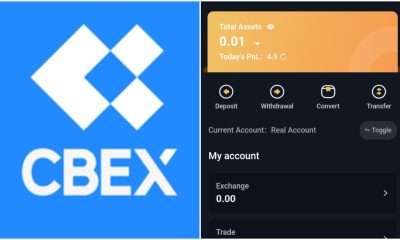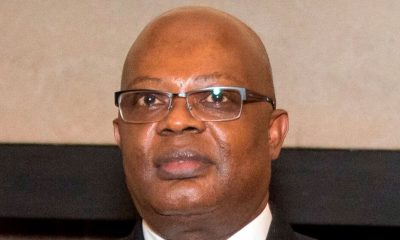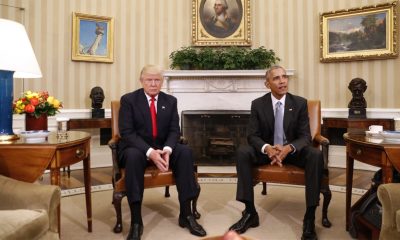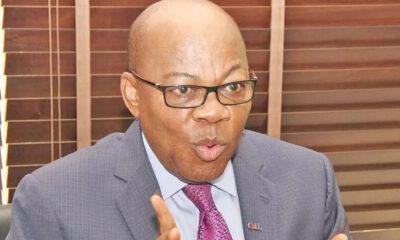News
Amid fuel scarcity, petrol marketers threaten to withdraw services over ₦200bn debt

Amid fuel scarcity, petrol marketers threaten to withdraw services over ₦200bn debt
The Independent Petroleum Marketers Association of Nigeria (IPMAN), has asked the Federal Government to pay ₦200bn the association is owed or the nation will face devastating socio-economic consequences.
The association threatened to withdraw its services, hence impeding the supply of Premium Motor Spirit (PMS), also known as petrol, over non-payment of the ₦200bn bridging claims.
IPMAN’s threat comes amid the worsening nationwide petrol scarcity which has seen prices of Premium Motor Spirit (PMS), also known as petrol, surge to between N610 and N800 at the pump, and between N1000 and N1200 at black market.
The association’s position was contained in communique released by the association’s Unit Chairman and Spokesperson, Aba Depot, Mazi Oliver Okolo after a press conference on Tuesday.
Okolo who handed down the threat said the IPMAN’s national leadership is wholly in support of the tough stance.
He claimed that the debt is being owed by the Nigerian Midstream and Downstream Petroleum Regulatory Commission (NMDPRA).
In the communique, Okolo said NMDPRA refused to pay the ₦200bn debt despite a directive for payment from the Petroleum Minister (Oil) Heineken Lokpobiri.
The IPMAN deport Chairman disclosed that since the directive by the minister in February 2024, only ₦13bn had been paid to their members, saying that the unpaid claim had crippled their businesses.
READ ALSO:
- Navy rescues 250 passengers onboard capsized Rivers boat
- Suspend new electricity tariff, Reps tell NERC
- Senate in rowdy session over sitting arrangements
“We are extremely distressed and depressed by the laidback attitude of the leadership of the Nigerian Midstream Downstream Petroleum Regulatory Authority (NMDPRA), towards the survival of our member’s businesses, arising from NMDPRA’s deliberate delay and refusal to offset the debt of over N200 Billion owed our members, which has consequently led to the deaths of many of our members and the unfortunate collapse of their businesses.”
He blamed the Nigerian National Petroleum Company Limited (NNPCL), the sole importer of petroleum products, for the current nationwide petrol scarcity, adding that some of its members have “completely” shut down their businesses, and retrenched their employees.
“We have watched with apprehension also, the unpatriotic attitude of the leadership of the NMDPRA to offset this debt that has been accrued to us since September 2022. As businessmen and women, our members acquired bank loans to keep their fuel retail outlets running daily across the nooks and crannies of Nigeria, to serve the teeming population of Nigerians. However, it is demoralising to know that many of our members have gone bankrupt and have become financially insolvent as a result of their inability to meet their financial obligations to their banks, arising wholly from their inability to get their monies from the NMDPRA. Consequently, also, the banks have taken over the business premises of many of our members. As indigenous organisations, and Depot Chairmen, we are unhappy that rather than receive support from the government to boost our businesses, we are being discouraged, by the head
of NMDPRA.
READ ALSO:
- Fuel Scarcity: Lagos warns stations against causing traffic gridlock
- Lagos Court orders Air Peace to answer FIJ’s queries on aircraft operations
- Woman arrested in Ogun after husband commits suicide
“It is noteworthy to recall and state here that at a stakeholders meeting held on the 20th of February, 2024 with Mr. Heineken Lokpobiri, the Honourable Minister of Petroleum Resources (Oil), and the NSA Nuhu Ribadu, Engr. Farouk Ahmed, the Chief Authority of NMDPRA, was mandated by Mr. Heinehken Lokpobiri to clear the entire debt in 40 days. However today, we have crossed the 40 days time-lapse given to the NMDPRA to clear the debt, and it is shameful to state that only the paltry sum of N13Billion has been paid, thus going the
whole length to ignore our plight without remorse and without recourse to the Honourable Minister’s directive,” according to the statement.
Okolo also claimed that the NNPC Ltd imports the products, and supplies to private depots who then sell to them at exorbitant prices of between ₦820 and ₦950 per litre, adding that IPMAN members pay an extra ₦2m to transport it to other parts of the country, making it difficult for them to sell to Nigerians at the agreed pump price.
The IPMAN members called on President Bola Tinubu, to closely look into the matter, which according to them, is highly detrimental to their businesses and reverse it forthwith, as it is bound to impact negatively on the masses thereafter.
“We see no reason why there should be an increment of over 500% on the Sales and Storage License by the NMDPRA. We totally reject it. We also hereby call on the federal government of Nigeria to wholly intervene forthwith in these lingering issues between the Independent Petroleum Marketers Association of Nigeria (IPMAN) and the Nigerian Midstream & Downstream Petroleum Regulatory Authority (NMDPRA).
“We are poised to take far-reaching decisions that may cripple the supply and sales of petroleum products across Nigeria, if our demands are not met within the shortest period,” the group said.
Amid fuel scarcity, petrol marketers threaten to withdraw services over ₦200bn debt
News
Libya nabs three Nigerians over drug trafficking

Libya nabs three Nigerians over drug trafficking
The Samnu Police Department in southern Libya detained three Nigerians for drug trafficking.
According to a statement issued by Migrant Rescue Watch on X (previously Twitter) on Sunday, the suspects were apprehended carrying a quantity of hashish that officials believe was meant for sale.
The arrests were made during a targeted operation in the town of Samnu, Murzuq region, which is known for smuggling and human trafficking due to its proximity to Libya’s southern borders.
READ ALSO:
- EFCC arrests 36 suspected internet fraudsters
- Obama reacts as Trump freezes $2.3b Harvard University funding
- Peter of P-square testifies against brother in fraud case
This operation is part of a larger security effort to combat drug-related crimes and cross-border trafficking of migrants.
The suspects’ identities have not yet been made public. Authorities acknowledged that the case had been turned over to the public prosecutor for further investigation and judicial action.
The statement said. “Samnu Police Dept. arrested 3 #migrants of Nigerian nationality on charges of drug trafficking. The trio were found in possession of a quantity of hashish earmarked for sale. The case was referred to public prosecution.”
Libya nabs three Nigerians over drug trafficking
News
NIS expands contactless passport renewal to United States, others

NIS expands contactless passport renewal to United States, others
The Nigeria Immigration Service (NIS) has announced the expansion of its Contactless Biometric Passport Application System to several countries in the Americas.
In a recent statement by ACI AS Akinlabi, Service Public Relations Officer at NIS Headquarters in Abuja, confirmed that the service under Comptroller General Kemi Nandap is rolling out the next stage of implementation across Brazil, the United States, Mexico, and Jamaica this month.
The contactless system, which enables Nigerians living abroad to renew their travel document without physically visiting passport offices for biometric enrollment, went live in the United States on April 11. Mexico, Brazil and Jamaica are scheduled to gain access on April 14.
READ ALSO:
- I don’t have a second wife or family – Super Eagles striker Brown Ideye
- OAU student electrocuted while retrieving football from nearby compound
- Bomb blast: Senator Ndume visits victims at hospital, offers financial support
“This expansion represents our commitment to innovative and efficient service delivery to Nigerians anywhere in the world,” said ACI AS Akinlabi, Service Public Relations Officer at NIS Headquarters in Abuja.
The application system is currently available on the Google Play Store as “NIS Mobile” and allows passport renewal without in-person biometric enrollment. An iOS version for Apple devices is under development and will be released soon, alongside an enhanced version of the Android app to improve user experience and accessibility.
The NIS further confirmed that the Contactless Passport App is now operational in Canada, the USA, Mexico, Jamaica, Brazil, Europe, and Asia. Australia and Nigeria itself remain pending, with implementation dates to be announced in the future.
NIS expands contactless passport renewal to United States, others
News
Tariff: NACCIMA warns against economic instability, job losses

Tariff: NACCIMA warns against economic instability, job losses
The Nigerian Association of Chambers of Commerce, Industry, Mines, and Agriculture (NACCIMA) has expressed fear that unless the Federal Government takes deliberate steps to increase Nigeria’s non-export earnings, the current global tariff war may lead to job losses, low foreign exchange inflow, and economic instability.
This was the position of the President of NACCIMA, Dele Oye, as the chairman at the Vanguard Economic Discourse 2025 with the theme, “Nigeria’s Economic Outlook 2025: Hardship and Pathways to Sustainable Recovery”, held last week in Lagos.
Among other things, Oye who is also the Chairman of the Organised Private Sector of Nigeria (OPSN), emphasized the need for a viable and affordable homegrown democracy.
His words: “In this pivotal moment, we must recognize and confront the significant challenges before us—challenges that have been magnified by the advent of America’s “America First” policy.
READ ALSO:
- Portable arrested over alleged defamation against Osupa
- Varsity strike looms as NASU alleges secret ASUU-FG deal on allowance
- Despite trade spat with US, China exports rises 12.4%
“This paradigm shift in global trade, driven by protectionism and tariffs, presents a unique and formidable array of obstacles for developing nations such as ours.
“The world we once knew, one characterized by cooperative, rules-based trading systems under the World Trade Organization, has given way to an environment fraught with uncertainty. This transformation not only disrupts global markets and supply chains but poses an acute threat to our competitive standing in international trade.
“The recent implementation of a 14% tariff on Nigerian exports to the United States directly jeopardizes what has historically been a critical market for our key goods, including crude oil, liquefied natural gas, and agricultural products. “The ripple effects of reduced demand could precipitate job losses, economic instability, and a decline in vital foreign exchange inflows, particularly for our non-oil sectors”.
“Indeed, the ramifications of current U.S. policies go beyond tariffs. We are witnessing a significant decrease in funding for initiatives that empower Africa’s burgeoning start-ups. The $51 million cut from the United States Development Fund, which affects countries like Nigeria and Kenya, exemplifies the broader challenges we face. The grants previously allotted to our SMEs are critical for nurturing innovation and entrepreneurship within our local economies”.
In the face of these challenges, Oye said Nigeria must act decisively and strategically to reshape its economic destiny where adversity can give rise to opportunity.
Tariff: NACCIMA warns against economic instability, job losses
-

 Business2 days ago
Business2 days ago5 facts about trending digital trading platform, CBEX
-

 Insurance1 day ago
Insurance1 day agoLasaco Assurance attains ISO/IEC 27001:2022 certification for information security management
-

 metro3 days ago
metro3 days agoRivers administrator demands N300m refund from NBA after relocating conference
-

 International2 days ago
International2 days agoObama reacts as Trump freezes $2.3b Harvard University funding
-

 Politics3 days ago
Politics3 days ago2027: PDP governors reject alliance of opposition parties
-

 metro2 days ago
metro2 days agoBREAKING: Court strikes out defection suit against 27 pro-Wike Rivers lawmakers
-

 metro2 days ago
metro2 days agoNatasha’s allegation against Akpabio has contradictions – Agbakoba
-

 Politics1 day ago
Politics1 day agoNNPP lawmakers seek to rejoin APC after fallout with Kwankwaso













